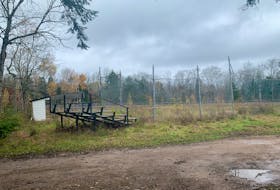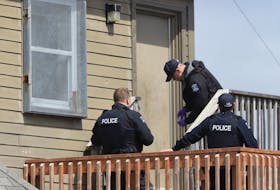PUGWASH, N.S. – Depending on who you talk to, fracking could inject new life into Cumberland County - or it will kill it.
About 200 people gathered at the Pugwash Curling Club Sept. 13 to listen to two economists, Gerard Lucyshyn and Michael Bradfield, debate the merits of hydraulic fracturing, a process that involves pumping water, sand, and chemicals into shale and coal seams at high pressure in order to release natural gas.
“There are trillions of cubic feet of natural gas 7,000 feet below you within Cumberland County, in the seams in Springhill,” said Lucyshyn, vice-president of research at the Frontier Centre for Public Policy. “There’s an asset sitting in the ground that you could exploit along your coal seams. All you have to do is access it.”
He pointed to a study from March 2017 which estimated that there are 2.71 trillion cubic feet of natural gas in the ground in Cumberland County, of which 1.4 trillion cubic feet can be recovered.
“At your current royalty rate of five per cent you’re looking at the province receiving between a $75 million and to $275 million provincial royalty, with an asset of between $763 million and $4.6 billion asset sitting in the ground.”
Lucyshyn said only fear stops Nova Scotians from reaping the benefits of fracking.
“People say if you have one frack it’s going to cause a massive disaster. All I have to say is, ‘show me the evidence,’” said Lucyshyn. “Do not be caught up in fear. Use your rational and use the evidence.”
Lucyshyn flew in from Calgary for the debate. He said 180,000 wells have been fracked in Canada since the 1950s, mostly in the Western Canada, and says the technology is safer than ever.
READ MORE
• OPINION: Shale gas not an option for growing Cumberland County's economy
• OPINION: Hydraulic fracturing used safely in Canada for more than 60 years
Bradfield, a retired professor of economics at Dalhousie University, isn’t so sure.
“The basic proposition for economists is to look at the benefits and look at the costs. We’ve heard a little bit about benefits but I have a few warnings about the costs,” said Bradfield.
He said one major cost not taken into account is abandoned wells.
“How come Alberta has 15,000 orphaned wells per one company, Canada Natural Resources?” asked Bradfield. “That is 15,000 abandoned wells that will deteriorate over time and begin to leak methane and add to greenhouse gas problems.”
Bradfield also pointed to the need for an expensive regulatory regime, and said the chemicals used in fracking could leak into groundwater, proving detrimental to health.
“One of the explanations I’ve heard from the industry is that you have many of the same chemicals under your kitchen sink, but you don’t drink those chemicals,” said Bradfield.
READ MORE: The full argument from Michael Bradfield and Gerard Lucyshyn
• The case against fracking: Process more of a bust than a boom for Nova Scotia
• The case for fracking: Delays in decision costing Nova Scotians millions
• VIBERT: To frack or not to frack?
Mixed reaction
At the end of the debate people lined up to express their fears for the environment, ask questions, and make statements. Several Nova Scotians who work in the fracking industry got up to speak.
Truro’s John MacRitchie said he has worked on 25,000 fracking sites in Canada, the U.S. and India. In his many years spent on oilfields throughout the world he said that none of the fears expressed by opponents of fracking have been realized, including the fears expressed by people at the meeting.
“Some of the conversation here is absolutely mindless. I am being very candid,” he said.
Dartmouth’s Kelly Deveau owns land in Cumberland County. He has worked on fracking sites for 30 years. He agreed with MacRitchie, saying “there’s a lot of false stuff being said here.’
“I’m a living study. For 30 years I’ve handled the chemicals, I’ve pumped the chemicals, and I’ve used the chemicals,” said Deveau. “I don’t have five arms, I can run 5K, and I can carry anybody out of here on my back.”
He said there are far more dangerous industries.
“Fracking is far less dangerous than the pulp mill spewing stuff in Pictou. It’s much less dangerous than the hundreds of tons of human crap being pumped in the water in Montreal and flowing down here.”
He said it would be very beneficial if fracking gained traction in Nova Scotia.
“I have 200 friends in Alberta from Nova Scotia who would be here in a heartbeat,” said Deveau. “Two hundred people who would buy a house, 200 who would raise kids, buy snowmobiles, boats, and groceries.”
He says he hunts and fishes in Nova Scotia and wouldn’t promote fracking if it wasn’t safe.
“I love Nova Scotia. It kills me to get on a plane and leave this place. I would never bring something destructive to this place.”
'An important topic'
Douglas Leahey organized the debate. He thought it went very well.
“It’s an important topic and is a big issue in Cumberland County in terms of how we move forward,” said Leahey. “I think it’s important that both sides understand the other.”
Several Cumberland County politicians were at the event, including Tory Rushton, MLA for Cumberland South.
Asked if the debate changed any minds, Rushton said it would take more than one meeting to do so.
“I think it’s going to take a series of educational experiences for anybody to change their minds one way or another.”
Rushton campaigned on a no-fracking platform, saying he couldn’t support something he didn’t understand.
“This one night didn’t change my thoughts on it. It has to be an educational process,” he said.








